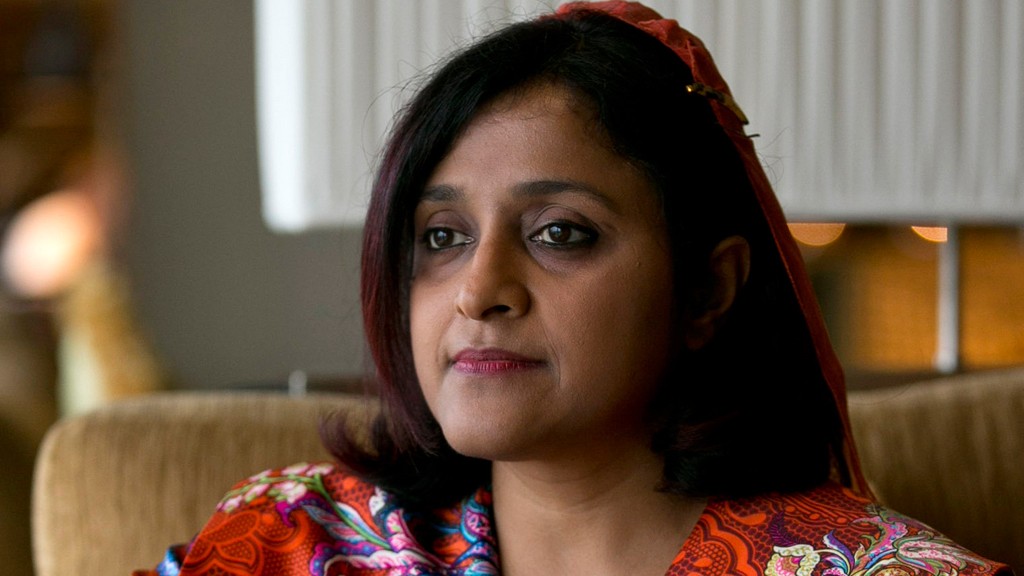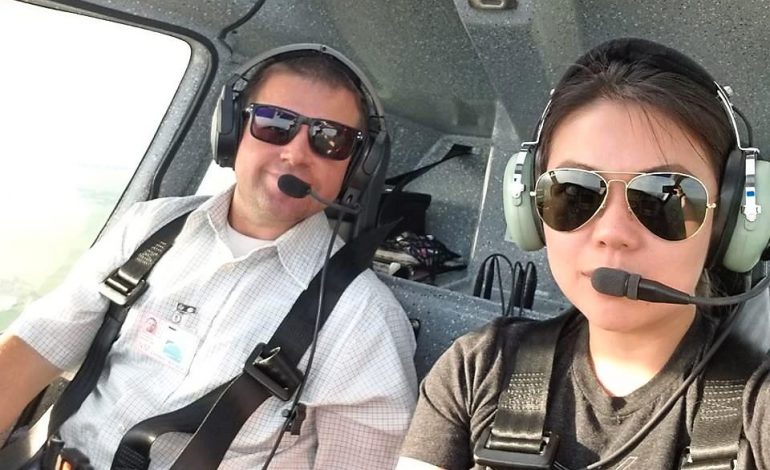Dunya Maumoon – Promoting Human Rights and Women’s Rights in the Maldives

Maldivian Foreign Minister Dunya Maumoon poses for a photograph during an interview with The Associated Press in Colombo, Sri Lanka, Thursday, Oct. 29, 2015. © AP Photo/Eranga Jayawardena
On the occasion of International Women’s Day Dunya Maumoon, Foreign Minister of the Maldives has been speaking out on women’s rights in her island nation. Maumoon, for many years has been an ardent supporter of human rights and women’s rights in the Maldives, is the daughter of a former president. In a DW interview she underlined her commitment to women’s rights at home and abroad.
DW: Education is the key for girls to be able to get to the same level as boys (or later, men) and you have been very committed to progress in this field. Have the Maldives achieved equal educational opportunity for girls?
The Maldives achieved gender parity in school enrollment some years back. The trend now is that girls are outperforming boys in both lower and higher secondary schooling. We are very proud of that achievement. The Maldives has also achieved universal primary enrollment. We achieved these milestones not just by enacting laws; but most crucially, by cultivating the value of education in the society. There, of course, remains much work to do across South Asian region, where boys remain 1.55 times more likely to complete secondary education than girls. But we remain delighted at the progress made so far in the Maldives.
–
DW: Why has it been so important for you personally as well as the government?
It’s a simple answer of common sense. Girls that complete a primary and secondary education lift themselves out of poverty. Incomes are higher and the dependency cycle of an early pregnancy followed by minimal output is cut. For us in the Maldives, it makes economic sense – not only do higher wages and better employment bring gains for women and their families, but our whole society fares better from a more balanced workforce. Productivity is higher, workforces are more efficient and development quicker and more focused. And as an extra incentive, it has been shown that children remain healthier and more educated when in turn their mothers receive a decent education. The American 19th century thinker Brigham Young said “You educate a man; you educate a man. You educate a woman; you educate a generation.” I couldn’t agree more.
But above all the argument is a moral one. Education is a human right. The Universal Declaration of Human Rights and the United Nations Convention on the Rights of the Child have set in stone humanity’s commitment to education for girls. The World Bank still estimates there are approximately 30 million girls out of school. We will continue to contribute to the global effort to eradicate this disparity.
–
DW: What role does conservative Muslim society play in girls’ education in the Maldives? What kind of resistance have you had to deal with in your campaign for women’s rights in your country?
It is worth remembering that, considering the era in which he lived, our Prophet Muhammad (PBUH) advocated women’s rights and partnership between men and women. His teaching radically improved the status of women at the time – and Islamic law not only gave the right of women to be educated, but also ensured they could both own and inherit property.
In terms of resistance, there does not need to be any and we have experienced none – the success we have had in achieving gender parity in the Maldives shows that our religious institutions can work successfully in partnership with government bodies to supply girls with a full, well rounded education, one in which Islam is incorporated, but which also recognizes the now accepted right for all young people to be educated.
In some parts of the Muslim world, women face both political, cultural and societal challenges. But these also exist globally – recent controversy over the gender pay gap in western companies is an example of this.
Despite the immeasurable contribution of women to our societies, we still live in a world where women and girls are considered inferior. Their rights are being violated too often. Their potential at large still remains untapped. Our failure to close the gender gap remains one of the greatest injustices of our times. On this International Women’s Day, we renew our commitment to empower girls, advance women’s right and to closing the gender gap.
–
DW: To what extent does Maldives society support the idea of full gender equality? What kind of measures need to be adopted to move the country in this direction?
Completely. I don’t think we would have achieved what we have without the support of all Maldivians and our developmental partners at both home and abroad. But we have also followed that up with action. For example, custom or tradition should never be used as a pretext to tolerate any forms of violence against women and girls. President Yameen’s Government maintains a zero-tolerance policy on violence against women. Through the enactment Sexual Harassment and Abuse Prevention Act and the Sexual Offences Act (2014) and the Domestic Violence Prevention Act (2012), the Government has ensured legal safeguards for women against any discrimination. Prevention remains a cornerstone of these laws.
As long as we keep our path towards universal education, and ensure opportunities in all sectors are left open to women, I have every faith in our goal of full gender equality is within reach. In the Maldives, there are a number of women occupying powerful positions both in the Government and in the business sector. Our cabinet now has several extremely capable female ministers. The Governor of the Maldives central bank is woman, and by the way, there are only a handful of female governor around the world. Most executive positions in the commercial banks in the Maldives are occupied by women. And my own team in the Ministry of Foreign Affairs has some brilliant young female minds. I hope we can continue this pattern.
–
DW: What should women do (besides getting better education) to be able to reach a position in politics like yourself?
Certainly women’s role in leadership positions remains restricted – not just in politics, but also in business too. This is unfortunate, as women have proved the strongest advocates for change – from Emmeline Pankhurst to Rosa Parks, to modern day figures such as Angela Merkel or Melinda Gates.
In terms of solutions, the UN is already doing great work in this area, ensuring gender equality is at the very center of public policy making. As governments, we also have a duty to help aspiring young women reach positions of influence providing extra training, and engaging with communities and political organizations alike to empower women further. I don’t doubt the determination of women in the Maldives to aspire to positions of power or influence in any walk of life. But too often, across the whole world, structural or institutional barriers stand in their way. It is the duty of lawmakers to advocate for constitutional and legislative changes that give women the fair playing field they so desperately deserve. Once that happens, I see transformative change happening.
–
DW: What would you recommend based on your own career and experiences?
To have faith in your own voice and your own ability. The modern era is one in which gender equality is becoming a major issue. But we are trying to alter centuries, if not millennia, of prejudice. Every week in my job I meet brilliant and engaging young women who have just as much to offer as their male counterparts. The leaders of tomorrow are out there, and they need to be confident of their ability to only to be heard.
_
DW: Are there specific steps that they should/could take? What can/ should the government do to support this?
As we have discussed, education is the basic foundation to this project. For us in government, it is setting the constitutional and legislative framework that allows true gender parity to flourish. We are seeing a slow shift in policy globally, but there is still a lot more to do. Organizations like the UN are helping deliver this agenda, but it is also the responsibility of political leaders on a local level to jettison old and outdated thinking and understand the benefits of ensuring that a society can only truly flourish when everyone benefits form access to education and economic opportunity.
–
DW: To what extent has the Maldives been able to improve women’s health in recent years?
Again, great strides have been made. With the new constitution, a decentralization policy ensures equitable access to health care for all. Our Health Master Plan 2006-2015 redirected our policies and strategies based on national development priorities, including improving the standard of healthcare for women. The Ministry of Health provides comprehensive public health services – primary, preventive and curative care services. Almost 90 per cent of inpatients and 70 per cent of outpatients’ services were provided by the public sector health facilities.
A lot of work has been undertaken to improve maternal, child health and reproductive health in our country. There is almost universal coverage of antenatal care and almost every birth takes place in a health care facility attended by skilled providers. There is more work to do, but 99% received skilled antenatal care (with 85% receiving four or more ANC visits), while 95% delivered in a health facility. Our government takes women’s health extremely seriously, and we will look to build upon these gains further during this parliament.
–
DW: What are the major obstacles which need to be overcome in the Maldives to ensure that women can enjoy the same rights as men in the coming years?
Women’s potential in our country still remains untapped. On International Women’s Day, we should renew our commitment to empower girls, advance women’s rights and to closing the gender gap. With the formation of the National Committee and the Technical Committee for the Implementation of the 2030 Agenda, we have already embarked on this journey. Our policies and legislature must be approached from a gender perspective if we are to achieve a “planet 50:50”. For this to happen, we need to ensure that women’s voices are heard in the Maldives – not only through ballots cast but by allowing women to be elected as decision makers and political leaders. We must cultivate a culture that advocates women’s participation in the halls of the parliament and political offices. Rigid cultural values should not remain as an excuse for prejudice against women to prevail. I will certainly continue to advocate for change and I will be urging my colleagues to join me.
Interview: Grahame Lucas / Marjory Linardy






